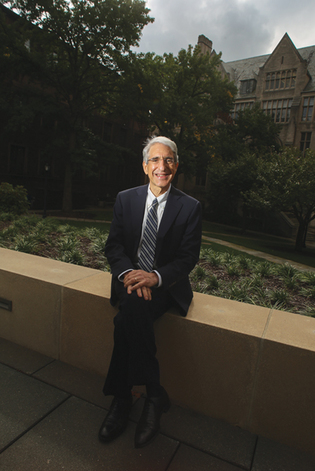
Mark Ostow
The Yale Alumni Magazine publishes a letter from President Peter Salovey ’86PhD in every issue. In this letter, the president recalls previous university chaplains at Yale, and welcomes the newest.
View full image
As I consider the pressing challenges circling the globe, I find myself reflecting on the pillars of strength that are foundational to a community—including those that have guided members of our university and those that will ensure Yale’s excellence in the years to come. I think especially of our chaplain’s office: one such pillar. Established in 1927, the Yale chaplaincy has helped our university navigate many turbulent moments in the last century.
Sidney Lovett ’13, university chaplain from 1932 to 1958—lovingly known as “Uncle Sid”—helped steer Yale through the turbulent years of World War II. With anti-Semitism pervasive in the US and authoritarianism on the rise in Europe, in 1933 he launched a counseling program for Yale’s Jewish students; it eventually became the Yale Hillel Foundation.
“Uncle Sid” also helped to establish Yale’s Department of Religion, and in 1948 he cofounded the National Association of College and University Chaplains. In the words of Yale president A. Bartlett Giamatti ’60, ’64PhD, Sidney Lovett “embodied all that Yale stood for and wanted to be. Perhaps no other Yale person in this century touched as many lives in this community and beyond.”
William Sloane Coffin Jr. ’49, ’56BD, succeeded Lovett in 1958 and left an indelible mark on our campus—and the world—through his advocacy for peace and contributions to the civil rights movement. Coffin’s preaching, nationally acclaimed, brought Yale’s chaplaincy into new prominence. He also organized the Yale Religious Ministries, a group of campus ministers that still meet today. It is a foundational component of the chaplaincy’s work.
During my time as president, I have relied on the chaplaincy for trusted counsel. Sharon Kugler, who stepped down as university chaplain after 16 extraordinary years, provided invaluable counsel to me personally and to the university, especially as we weathered the COVID-19 pandemic.
Sharon’s legacy at Yale is profound. The first woman and first Roman Catholic in this role, Sharon’s contributions included creating space on campus for a Hindu prayer room and a Buddhist shrine. She started the Interfaith Forum at Yale (IFFY), a group of undergraduates who build community across a wide variety of religious and spiritual identities and understandings.
The chaplaincy today is wide-ranging, interfaith, and inclusive. It serves an array of communities across campus. Some of my favorite memories are connected with the chaplaincy. I have enjoyed Shabbat dinners at the Slifka Center, joined picturesque Eid al-Fitr celebrations marking the end of Ramadan, attended extraordinary Hindu Holi celebrations in the spring, and witnessed the beautiful candlelit Lessons and Carols service in Battell Chapel that marks the start of Advent. I love the fact that the chaplaincy exemplifies hospitality and welcomes everyone to religious events and services on campus.
In January, we announced Maytal Saltiel as Yale’s eighth university chaplain. Maytal has been with the chaplain’s office since 2013; she arrived as assistant chaplain for special programs. She was named associate university chaplain in 2016 and has served as interim university chaplain since last summer.
Maytal is Yale’s first Jewish university chaplain. Her efforts to build and strengthen community across divisions underscore a longstanding commitment to interfaith work. This is reflected in her teaching. For example, last semester at the Divinity School she cotaught a course with Omer Bajwa, director of Muslim life, on the models and methods of university chaplaincy. She has done extensive work in this area at Yale and has supported the numerous religious communities on our campus with great care.
As university chaplain, Maytal provides strategic direction, vision, and leadership for Yale’s dynamic and diverse religious and spiritual life on campus, working with students, faculty, and staff from a range of faith traditions, as well as those without any religious affiliation. She leads the chaplaincy team in offering pastoral care, interfaith engagement, and programs that support the mission of the chaplaincy and the university.
She and her colleagues in the chaplain’s office continue to serve as valuable partners to the campus community during times of crisis and emergencies. She also convenes regular meetings of Yale Religious Ministries.
Maytal’s extraordinary accomplishments, skills, and familiarity with Yale will ensure that the chaplaincy continues to foster a campus community of inclusivity and respect. Hospitality and tolerance must be taught at home before they can spread around the world. This is part of the mission of higher education: to create an environment where all are welcomed and where everyone can learn from the productive discourse that takes place when people of differing viewpoints come together.
By fostering a spirit of unity, understanding, and shared purpose, the chaplaincy helps to bring about a better, more welcoming Yale. It helps our students to be more empathetic critical thinkers today—and more excellent leaders of all sectors tomorrow.
 loading
loading